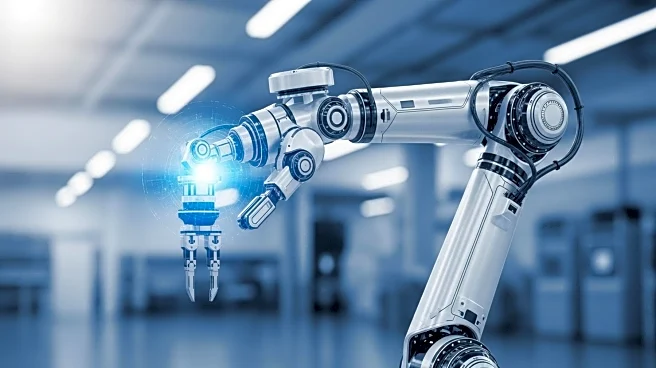What's Happening?
Manufacturers are facing significant challenges due to scattered data and outdated information, which hampers productivity and innovation. A recent study by Tech-Clarity highlights that engineers spend a substantial portion of their time searching for information, leading
to slower onboarding, design errors, and missed opportunities. Agentic AI, through the use of knowledge agents and generative AI, aims to address these issues by providing a continuous flow of data across the product lifecycle. This approach allows engineers to access precise information quickly, improving efficiency and reducing costs. Companies like Airbus Helicopters and TotalEnergies have already seen benefits, such as faster customer query resolutions and prevention of equipment failures.
Why It's Important?
The integration of AI in manufacturing is crucial for enhancing productivity and innovation. By closing the knowledge gap, manufacturers can reduce downtime, prevent costly errors, and improve safety. This transformation is essential for maintaining competitiveness in the industry. The use of AI agents allows for faster decision-making and smarter sourcing, which can lead to significant cost savings and improved operational efficiency. As manufacturers adopt these technologies, they can expect to see a shift in how they manage data and processes, ultimately leading to a more streamlined and effective production environment.
What's Next?
Manufacturers are encouraged to start with targeted use cases, such as knowledge search or maintenance support, before expanding to more complex applications like design and simulation. Investing in clean and connected data pipelines is essential for the success of retrieval-augmented generation (RAG) frameworks. Additionally, pairing AI with human oversight ensures that the technology complements rather than replaces human expertise. As companies continue to adopt these technologies, they will need to focus on reskilling their workforce to adapt to new processes and tools.
Beyond the Headlines
The adoption of AI in manufacturing not only improves efficiency but also has ethical and compliance implications. Ensuring that AI systems provide accurate and unbiased information is critical, especially in high-stakes environments. The use of AI also raises questions about data privacy and security, which manufacturers must address to maintain trust with stakeholders. As AI becomes more integrated into manufacturing processes, companies will need to navigate these challenges carefully to avoid potential pitfalls.














